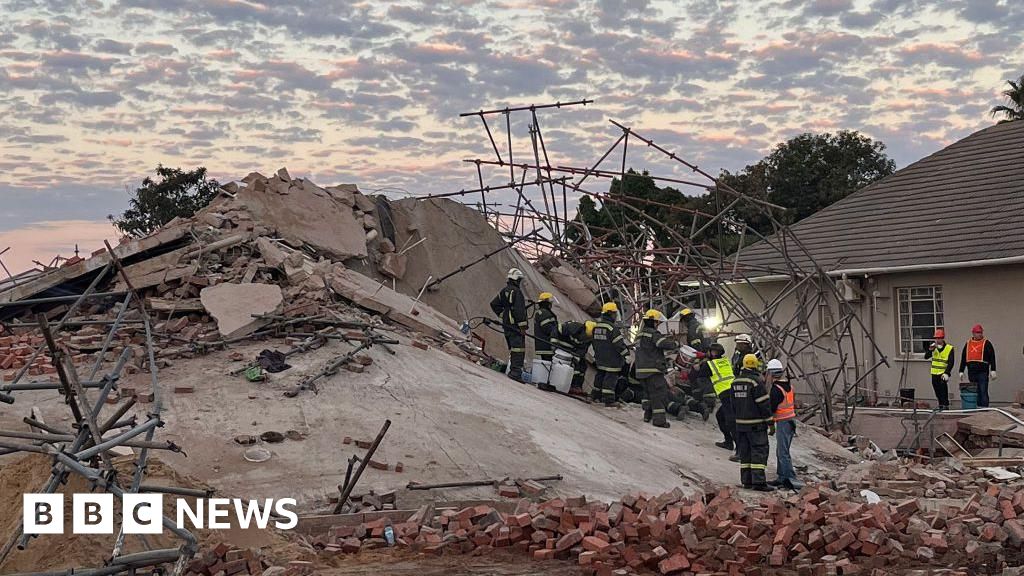South Africa building collse that killed 34 was 'entirely preventable', minister says

South Africa Building Collapse: Inquiry Finds Tragedy "Entirely Preventable"
An investigation into the collapse of a five-story building in George, Western Cape, that killed 34 construction workers in May 2024 has concluded that the tragedy was "entirely preventable." Public Works Minister Dean Macpherson revealed the findings, citing a catalogue of failures including the use of substandard materials, structural flaws, and ignored safety warnings.
The report paints a disturbing picture of a project plagued by red flags, some dating back a year before the collapse. Workers reported feeling vibrations and were allegedly instructed to conceal structural deficiencies with sand and inadequate concrete. The health and safety officer even resigned in protest due to the unsafe conditions, but construction continued.
"Red Flags Were Ignored"
"There were a number of red flags that were continually raised about this project," a visibly angered Macpherson stated. "The work should have stopped. These signs were a chance to turn back, but instead, problems with the building were 'covered up'."
Following a meeting with survivors and families of the victims, Macpherson vowed to pursue criminal accountability for those found negligent. A police investigation is currently underway, though no arrests have been made to date.
Survivors Face Trauma and Hardship
The collapse has left a trail of devastation, with many survivors grappling with physical injuries, psychological trauma, and financial hardship. Electrician Delvin Safers, trapped for 28 hours, sent voice notes to his family fearing his death. He believes those responsible for any shortcuts taken during construction should be held accountable. Another survivor, Elelwani, tearfully recounted how the incident has drastically altered her life, leaving her with lasting physical and emotional scars.
Expert Analysis: A Systemic Problem?
Dr. Alison Todes, a professor of urban planning at the University of Witwatersrand, argues that the George building collapse points to a broader systemic issue within South Africa's construction industry. "While the report rightly highlights the negligence and failures on this specific project, it's crucial to recognize that these incidents are often symptomatic of deeper problems," she explains. "These can include inadequate regulatory oversight, corruption within the construction sector, and a lack of enforcement of existing building codes, particularly in rapidly developing areas. The pressure to cut costs and expedite projects can often lead to compromises on safety and quality."
Historical Context: Building Collapses in South Africa
Building collapses are not uncommon in South Africa, often linked to rapid urbanization, informal construction practices, and a perceived lack of stringent regulatory enforcement. In 2014, a church hostel collapse in Nigeria, which killed many South Africans, prompted widespread outrage and scrutiny of building standards. While the George collapse is distinct, it underscores the persistent challenges in ensuring construction safety and accountability across the region.
Government Pledges Reform
Macpherson has pledged to introduce stricter regulations and reform outdated legislation to improve oversight in the construction industry. This includes a review of building codes, enhanced inspection processes, and increased penalties for non-compliance.
Investigations Underway
The probe into the collapse was conducted by the Council for the Built Environment, with a parallel investigation by the Engineering Council of South Africa. These investigations aim to determine the full extent of the failures and identify those responsible.
The Path to Justice
Deon Safers, father of survivor Delvin, expressed satisfaction with the report but emphasized the need for justice. "We want justice," he stated, highlighting the lack of compensation received by his son and other victims.
The George building collapse serves as a stark reminder of the human cost of negligence and the urgent need for comprehensive reforms to ensure the safety and integrity of the construction industry in South Africa.
Professor John Williams, a civil engineering expert at the University of Cape Town, emphasizes the importance of independent quality control. "The report suggests a breakdown in independent verification processes. It is vital that construction projects have robust quality control measures in place, independent of the contractors themselves, to identify and address potential safety risks before they lead to catastrophic consequences," he said. "This includes regular inspections by qualified engineers and rigorous testing of materials used in construction."
Originally sourced from: BBC News Africa
